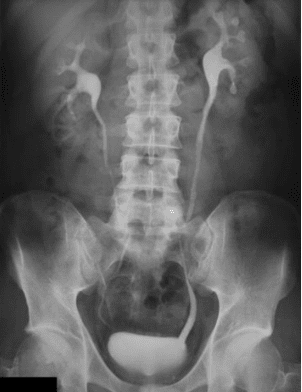Howard Fischer
Uppsala, Sweden
 |
| An IVU image showing the Kidneys, Ureter, and Bladder. 2007. Via Wikimedia. |
“Whatever it is, I’m against it.”
— Groucho Marx
It was the day of my exam in urology. In 1975 I was a sixth-year medical student (in a seven-year course of study) at an old, highly-regarded European university. After breakfast I put on my suit, a white shirt, and a conservative tie. All our exams were orals—face-to-face with the professor in an often anxiety-producing encounter.
Walking to the Surgical Institute, the site of the exam, I was relatively calm. I had gone to all the lectures, studied the material diligently, and felt I had a decent grasp of the subject. My real concern was this: Which of our two urology professors would be giving me the exam?
Professor A was tall, thin, easy-going, and a chain-smoker. Professor B was shorter, stouter, older, and seemed to like yelling (in our lectures, anyway). There was no way to know in advance who would be “interrogating” (that is the word we used) me. Probably whichever professor was free when a student showed up at the appointed time would be the examiner. I walked into the urology office and saw Professor A and Professor B. “Sit down,” Professor A invited, and grabbed a few intravenous pyelograms that were on his desk. These are X-ray examinations that use an injection of contrast material (“dye”) to evaluate the state of the kidneys, ureters, and bladder.
He showed me one and asked what I saw. I told him that there was a filling defect in one of the ureters, that is, an area where no dye was visible. “Yes, and what could that be?” he asked. “Well,” said I, “something is occupying some space in the ureter. It could be a stone, or a tumor, or . . .” Professor A nodded agreement, while professor B shouted, “No!” and gave some reasons why it was not so. I do not remember what they were; this was forty-five years ago. When the two professors started arguing with each other, I was forgotten and sat there silently.
Eventually we moved on to the second and third X-rays. Any interpretation I made that pleased one of the professors (either A or B) would elicit an argument from the other. After what seemed like a week, I was told I could go. It was uncommon to leave an oral exam without having an idea if one had passed or failed. Not this time.
I had no idea whether I had given a satisfactory exam or not. As I walked down the hall toward the exit, the urology resident who had been present during the exam ran after me, caught up with me, and assured me that I had passed.
Bless him and whoever sent him to inform me.
HOWARD FISCHER, MD, was a professor of pediatrics at Wayne State University School of Medicine, Detroit, Michigan.

Leave a Reply